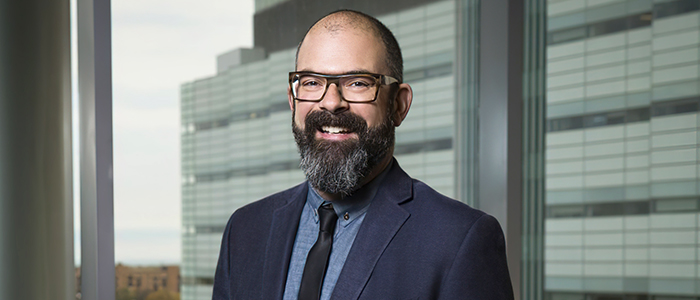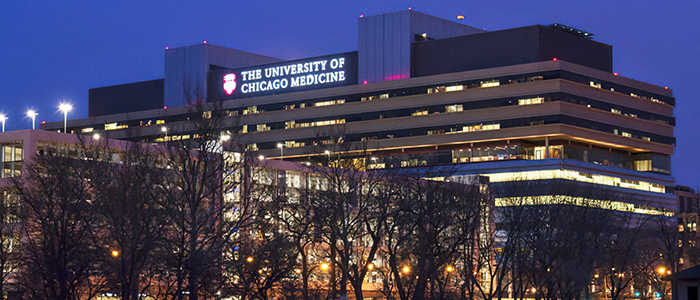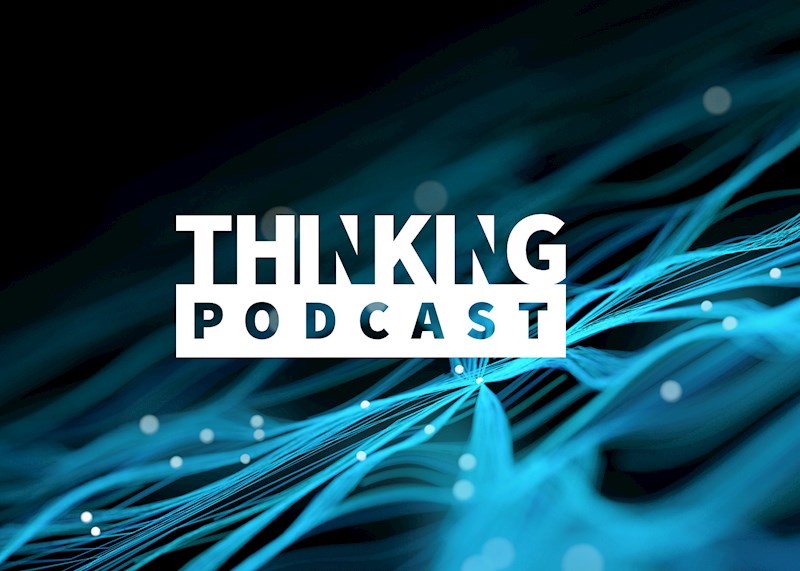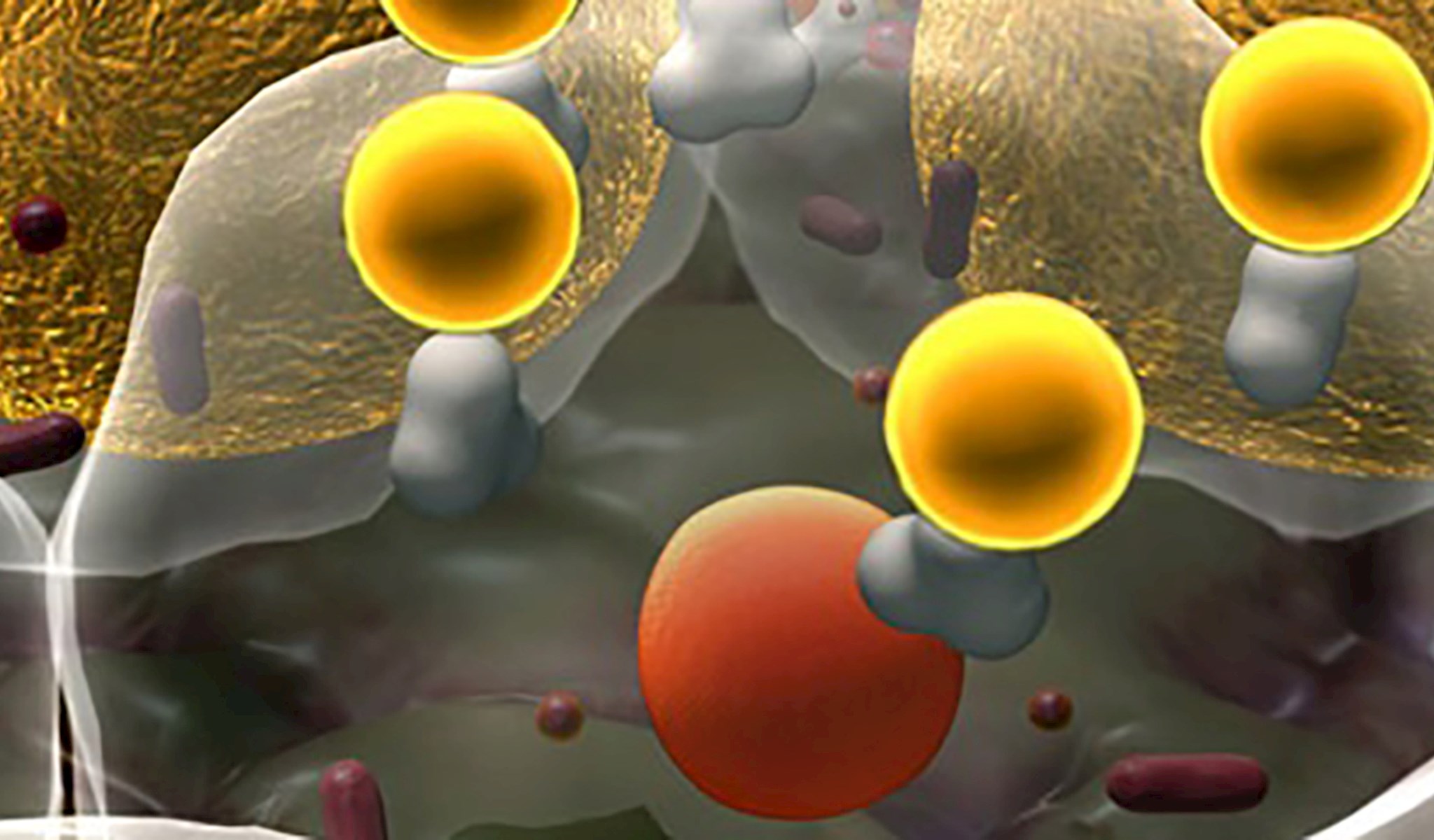Tech entrepreneur Justin Ullman is a champion of exploring new ideas, a passion he embraces to lead his company and his philanthropy. Those ideas are changing the world bit by bit.
Ullman is a William Blair client and CEO of RhinoDox, a cutting-edge technology company he founded in 2016 that provides automation and data analytics for commercial construction companies. RhinoDox’s early beginnings date to a family warehouse business his great-grandfather started in 1913 that later became a founding agent of Allied Van Lines. Ullman joined the family business in 2004, which was sold in 2009. But Ullman held on to an idea he was working on at the time, separate from the family business, and rebranded it as RhinoDox.
About the same time, Ullman got involved with the University of Chicago’s cancer research initiatives—first in 2003 as a member of the University of Chicago Cancer Research Foundation (UCCRF) associates board to today as president of its board of trustees. The board includes business, civic, and healthcare leaders with a mission to support the cancer research of UChicago scientists.
“As a technology entrepreneur, I’m especially interested in harnessing the power of data, the use of artificial intelligence, and bringing great ideas to the market that can help improve lives,” Ullman said in a February interview. “These interests of mine align with the strengths of the University of Chicago Medicine Comprehensive Cancer Center and many of its physician-scientists and researchers.”

Ullman and his family have a long tradition of engaging in their communities and investing philanthropic dollars in causes important to them. Among these, the family established the Ullman Scholars Fund in Cancer Immunology and the Ullman Fund in Cancer Immunology in 2015. These funds support the university’s leading work in immunotherapy research.
“My father was a very philanthropic person and instilled in me to give as much as I can.”
“It’s always personal,” Ullman said. “I tell people to find something that is meaningful to you and go give as much time, talent and treasure as you can because you never realize how little can do so much.”
For Ullman, cancer research is personal. His family has a long history of cancer, including his dad who passed away in 2013.
“As a testament to the world-class work going on at the University of Chicago, when my father was diagnosed he went to all the household name institutions for cancer. They all told him to get his affairs in order and that he had, at most, three months to live,” Ullman said.
His dad then went to UChicago and met with the same doctors who treated 3-star-Michelin-chef Grant Achatz and was told about a novel treatment they were working on.
“It not only worked but it extended his life five years,” said Ullman. “He was able to see his first five grandchildren enter this world.”
Investing in unproven ideas
He and his family were early supporters of the pioneering work in cancer immunotherapy by many scientists at UChicago, including superstar Tom Gajewski, MD, PhD. Gajewski was one of the first to discover the connection between the presence of specific strains of intestinal bacteria and response to cancer immunotherapies.
“I knew Tom 20 years ago when immunotherapy research wasn’t exploding,” Ullman said. “But some of those early investments we made, supporting Tom and young faculty with completely unproven ideas, had completely outsized ROI years down the road.”
Ullman recalled those days when Gajewski needed $30,000 to purchase equipment that was critical for his early immunotherapy research. He couldn’t secure funding from the National Institutes of Health (NIH) because his idea was unproven. But Ullman was able to help and that equipment aided Gajewski's research.
“The ability to augment research like this with these kinds of gifts, allows scientists like Tom to secure much larger NIH grants," he said. “Being able to let these brilliant scientists explore their ideas, unencumbered because we’ve made a philanthropic investment, feels like a gift to me that I’m able to do that.
“The small gifts supporting a researcher’s idea, I can’t tell you how impactful they can be in the short run and long run. Just think about the vaccines for COVID. That technology was 20-30 years in the making. But years ago someone had an idea.”

Among Ullman’s many talents—innovator, technology futurist, rock-and-roll guitarist—is his ability to bring people together to tackle challenges and drive change.
The past year has been especially challenging for the University of Chicago’s extraordinarily diverse community. Located in the city’s South Side, the university expanded its commitment to serving its neighbors—many of whom experience huge disparities in income and healthcare that only intensified during the pandemic. That commitment included UChicago Medicine’s annual investment of over $500 million in benefits and services to support patient and community programs.
One challenge the cancer research foundation board addressed was helping bridge a digital divide where families lacked access to personal technology devices, Ullman said. Board member Charles Brooks led the effort to supply laptops and tablets to low-income cancer patients so they could connect digitally, gaining access to telehealth.
“To get those devices in someone’s hands who couldn’t afford it,” Ullman said, “to be able to change the diagnostic approach so someone might be able to get health advice earlier and keep up with communications—literally can save lives. It’s incredibly exciting what a community can do to change the face of life science, health outcomes, and our city.”
Chicago, an emerging life sciences leader
A great example is the movement now underway to make Chicago an AI–life sciences leader.
Ullman is among a group of entrepreneurs, scientists, investors, universities, and public and private companies that have banded together to attract a new type of innovator to the Midwest region away from the coasts.
On the forefront is Portal Innovations, Ullman said, a new incubator for biotech start-ups led by seasoned entrepreneur John Flavin. He has a long history with the University of Chicago, including having led the university’s Polsky Center for Entrepreneurship and Innovation. Flavin also co-founded Pyxis Oncology with Gajewski—a start-up out of University of Chicago now based in Boston to develop drug therapies for cancer.
Among the companies Portal incubates is ClostraBio, a microbiome biotech started at the University of Chicago. Portal is also working on the next cohort of Pyxis Oncology in Chicago.
“Portal is meeting this need with a world-class team, state-of-the-art labs and seed capital,” Ullman says. “This will allow more companies to start and stay in Chicago. We are leveraging partners like William Blair, Trammel Crow, and CBRE to support our growth and the growth of the ecosystem.”
“When you put a very committed group of people together, willing to give time, treasure and talent, you can accomplish things seemingly impossible,” he added. “And what most people don’t realize is that it’s happening right in our backyard. It’s really an incredible time for Chicago and I’m just happy to be able to help where I can.”




